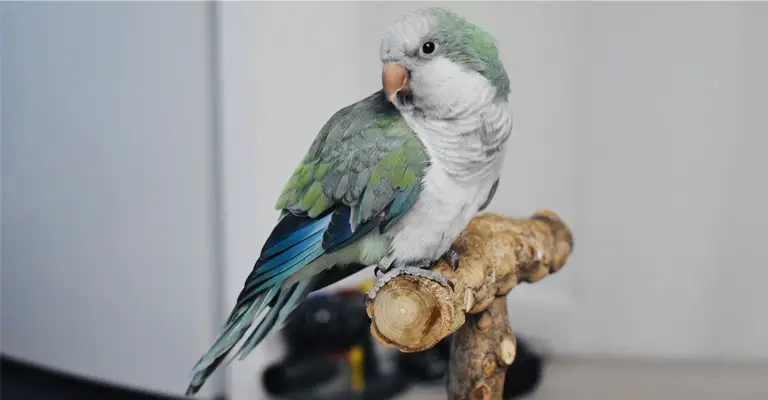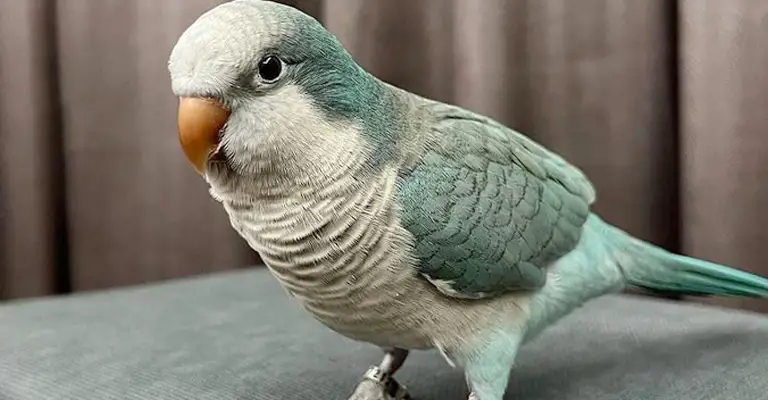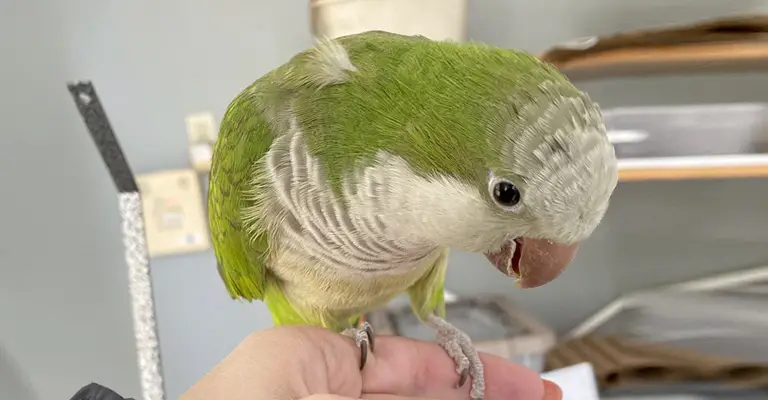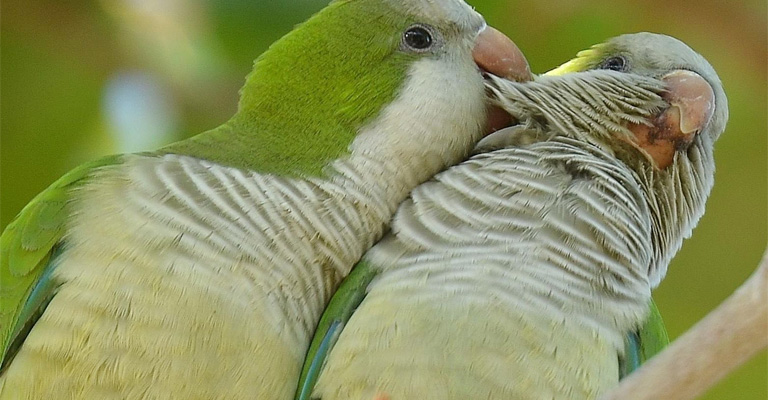Quaker parrots, also known as Monk parakeets, have long captivated bird enthusiasts with their charming personalities and striking green plumage. But one aspect that often raises eyebrows among potential owners is their vocal habits.
Are Quaker parrots loud? This blog post aims to shed light on this frequently asked question and provide insights into understanding and managing their unique vocalizations. Quaker parrots, native to South America, are renowned for their vocal abilities.
While their petite size might deceive you, these birds are no strangers to making a range of noises, from melodious chirps to enthusiastic squawks. Yet, misconceptions and uncertainty often surround the noise levels associated with these delightful companions.
Here, we’ll explore the factors influencing Quaker parrots’ vocalizations, common misconceptions, and practical tips for managing their noise in a way that ensures a harmonious coexistence with your feathered friend. Stay focused.

The Vocal Abilities of Quaker Parrots
Quaker parrots, also known as Monk parakeets, are renowned for their impressive vocal abilities. These small, intelligent birds are skilled mimics, capable of replicating a wide range of sounds and voices.
They often mimic household noises, such as doorbells, microwaves, or even the sound of a telephone ringing. Their natural vocalizations include a variety of chirps, squawks, and whistles, which they use for communication within their flocks.
While they may not be as prolific talkers as some larger parrot species, some Quaker parrots can be taught to mimic human speech to a limited extent.
It’s essential to note that not all Quaker parrots will develop the same level of vocal proficiency, and individual variation exists.
Proper socialization, training, and interaction with their human companions can enhance their vocal talents. These charming and charismatic birds make delightful pets, in part due to their entertaining vocal skills.
Are Quaker Parrots Loud?
Yes, Quaker parrots are known for being relatively loud birds compared to some other parrot species. They have a naturally robust vocalization repertoire, which includes squawks, chirps, and whistles. When excited or communicating with their flock, they can produce high-pitched and enthusiastic sounds.
While their noise level is not as piercing as some larger parrots like macaws or cockatoos, it can still be quite noticeable, especially in a home setting. Keep in mind that the noise level can vary among individual birds.
Factors such as socialization, training, and the bird’s unique personality can influence how loud or quiet a Quaker parrot is. If you’re considering having a Quaker parrot as a pet, be prepared for some noise and provide them with plenty of social interaction and mental stimulation to help manage their vocalizations.
Factors Influencing Noise Levels of Quaker Parrots

Several factors can influence the noise levels of Quaker parrots:
Individual Personality
Just like humans, each Quaker parrot has its unique personality. Some may naturally be more vocal and noisy than others.
Socialization
Proper socialization and interaction with their human companions can influence a Quaker parrot’s behavior, including its vocalizations. Birds that feel secure and connected to their owners may be less prone to excessive noise.
Environmental Stimuli
The surroundings play a significant role in a Quaker parrot’s noise level. If they are in a busy, stimulating environment with a lot of activity and noise, they may be more likely to vocalize to compete with or mimic those sounds.
Loneliness or Boredom
Quaker parrots are social birds and can become noisy when they feel lonely or bored. Providing them with companionship, toys, and mental stimulation can help reduce noise associated with boredom.
Mating or Hormonal Behavior
During breeding season or when hormonal changes occur, Quaker parrots may become more vocal as part of their mating behavior.
Training
Some Quaker parrots can be trained to be quieter on command. Positive reinforcement training can help teach them when it’s appropriate to be noisy and when to be quiet.
Diet and Health
Poor diet or health issues can sometimes lead to changes in behavior, including increased vocalizations. Ensuring your parrot is well-nourished and in good health can help manage noise levels.
Time of Day
Quaker parrots are diurnal, meaning they are most active during the day. They may be naturally noisier during their active hours, especially in the morning and evening.
Neighborhood Environment
If you live in an apartment or a densely populated area, consider the impact of your bird’s noise on neighbors. Taking steps to minimize noise, such as soundproofing or limiting noisy activities during sensitive times, can help maintain good relations with neighbors.
While Quaker parrots can be noisy at times, they are also intelligent and affectionate pets. Proper care, socialization, and training can help manage their noise levels and make them enjoyable companions.
Common Misconceptions Regarding Quaker Parrots’ Voice

Several misconceptions exist regarding Quaker Parrots’ voices. Here are some common ones:
They Can Talk as Well as Larger Parrots
While Quaker parrots are known for their vocal abilities, they are not as proficient at mimicry as some larger parrot species like African Greys or Amazon parrots. They can learn to mimic words and phrases to some extent, but their vocabulary and clarity may be more limited.
They Only Mimic Human Speech
Quaker parrots are excellent at mimicking a variety of sounds, not just human speech. They can imitate household noises, other bird species, and even musical tunes.
All Quaker Parrots are Equally Noisy
Individual Quaker parrots vary in their noise levels. Some may be naturally quieter, while others are more vocal. Factors like socialization, training, and their environment also influence how noisy they are.
They’re Always Noisy and Annoying
While Quaker parrots can be noisy, especially during their active hours, they can also be quiet and well-behaved when they feel secure and content. Proper care, companionship, and mental stimulation can help reduce excessive noise.
Their Noise is Always Problematic
While Quaker parrot vocalizations can be a concern in certain living situations, some people find their sounds charming and endearing. It’s subjective, and many bird enthusiasts enjoy the lively atmosphere Quaker parrots bring to their homes.
They Only Make Loud Noises
Quaker parrots also produce softer, more melodic sounds, like chirps and whistles, in addition to their louder vocalizations. These softer sounds are often part of their everyday communication with their flock and humans.
These misconceptions can help potential Quaker parrot owners make informed decisions about bringing these lively and engaging birds into their homes. Proper care, attention, and training can help them manage and appreciate their unique vocal abilities.
Managing Quaker Parrot Noise

Managing Quaker parrot noise requires a combination of proactive measures and understanding their needs. Here are some strategies to help keep their vocalizations at a manageable level:
Provide Adequate Mental Stimulation
Boredom can lead to increased vocalizations. Offer a variety of toys, puzzles, and activities to keep your Quaker parrot mentally engaged. Rotate toys regularly to maintain their interest.
Social Interaction
Quaker parrots are social birds and thrive on interaction with their human companions. Spend quality time with them daily, talking, playing, and training. A happy, stimulated bird may be less inclined to be excessively noisy.
Establish a Routine
Birds often thrive on routines. Try to maintain consistent daily schedules for feeding, playtime, and sleep. This can help your parrot feel secure and less anxious, which can reduce unnecessary noise.
Positive Reinforcement Training
Teach your Quaker parrot basic commands and behaviors using positive reinforcement techniques. Reward them with treats and praise when they are quiet or when they follow your cues to be quieter.
Soundproofing
If you live in an apartment or have neighbors nearby, consider soundproofing the room or area where your parrot is housed. This can help minimize the impact of their vocalizations on others.
Provide a Quiet Space
Ensure that your Quaker parrot has a quiet and comfortable space for rest and sleep. Covering their cage at night can help signal that it’s time to be quiet.
Environmental Enrichment
Create a stimulating environment with a variety of perches, branches, and climbing opportunities. This not only keeps them engaged but also encourages physical activity, which can reduce restlessness and noise.
Address the Cause
If your Quaker parrot’s noise seems excessive or out of character, it might be a sign of an underlying issue like illness or stress. Consult an avian veterinarian to rule out any health concerns.
Consider a Companion
Some Quaker parrots thrive with the company of another bird. However, introducing a second bird should be done carefully, as compatibility is crucial, and it may not work for all Quaker parrots.
Be Patient and Consistent
Reducing noise may take time and consistent effort. Avoid scolding or punishing your parrot for being noisy, as this can lead to more stress and vocalizations.
Remember that some level of noise is natural for Quaker parrots, and they will always have periods of vocal activity. It’s essential to find a balance that suits both your bird’s needs and your living situation while ensuring they remain happy and healthy.
Tips to Make Your Quaker Parrot Quiet
While it’s important to understand that Quaker parrots are naturally vocal birds and cannot be made completely silent, you can take steps to help manage and reduce their noise level. Here are some tips:
Positive Reinforcement Training
Teach your Quaker parrot to respond to commands like “quiet” or “hush.” Reward them with treats and praise when they comply. Consistency is key to reinforcing these behaviors.
Create a Quiet Environment
Designate a specific area or room for your parrot’s cage that is away from high-traffic areas and noise sources like televisions and appliances. This can help reduce their exposure to external stimuli that trigger vocalizations.
Cover the Cage
Using a cage cover during the night can signal to your Quaker parrot that it’s time to rest. Ensure they get enough sleep, as tired birds are often noisier during the day.
Provide Engaging Toys
Offer a variety of toys and activities that can keep your parrot occupied. Puzzle toys, foraging toys, and chew toys can provide mental stimulation and reduce boredom-related noise.
Offer Social Interaction
Spend quality time with your Quaker parrot every day. Engage in activities like talking, playing, or training to meet their social needs and reduce attention-seeking vocalizations.
Routine and Consistency
Establish a daily routine for feeding, playtime, and rest. Predictability can help reduce anxiety and excessive vocalizations.
Soundproofing
If you live in close quarters with neighbors, consider soundproofing the room where your Quaker parrot is housed. Acoustic panels or curtains can help absorb some of the noise.
Address Stress or Health Issues
Excessive vocalizations can sometimes be a sign of stress or underlying health problems. If your parrot’s noise is unusual or persistent, consult an avian veterinarian to rule out any health concerns.
Consider a Companion
Some Quaker parrots benefit from the company of another bird. However, introducing a second bird should be done with caution, as compatibility is crucial, and it may not work for all Quaker parrots.
Be Patient
Reducing noise may take time and consistent effort. Avoid punishing your Quaker parrot for being noisy, as this can create stress and worsen the issue. Instead, focus on positive reinforcement.
Remember that Quaker parrots are naturally expressive and vocal creatures, so complete silence should not be expected. The goal is to strike a balance between their natural behavior and your comfort and that of your neighbors.
FAQs
Yes, Quaker Parrots can be noisy. They have a wide range of vocalizations, including squawks and whistles. Their noise level varies among individuals and is influenced by factors like socialization and environment.
While you can’t eliminate their natural vocalizations, you can manage Quaker Parrot noise through social interaction, training, and providing mental stimulation. Positive reinforcement and a consistent routine can help reduce excessive noise.
Yes, Quaker Parrots are diurnal, meaning they are most active during the day. They are often noisier in the morning and evening when they are most active and engaged.
Introducing a second Quaker Parrot can provide companionship and reduce loneliness, but it may not necessarily increase noise levels. Compatibility between birds plays a role, and some pairs may be quieter together.
Yes, you can use soundproofing methods like acoustic panels or curtains to minimize noise. However, it’s important to combine this with other strategies like positive reinforcement training and environmental enrichment for effective noise management.
Wrapping Up
Quaker parrots indeed possess vocal talents that can add vibrancy to your home. While they may not be the quietest of pets, understanding their vocal behaviors and implementing the strategies mentioned in this post can go a long way in creating a harmonious living environment for your feathered companion.
By fostering social bonds, providing stimulation, and being patient, you can appreciate the unique charm of Quaker parrots without being overwhelmed by their occasional cacophony.
With the right care and attention, these spirited birds can be both delightful and manageable additions to your household. Best of luck.